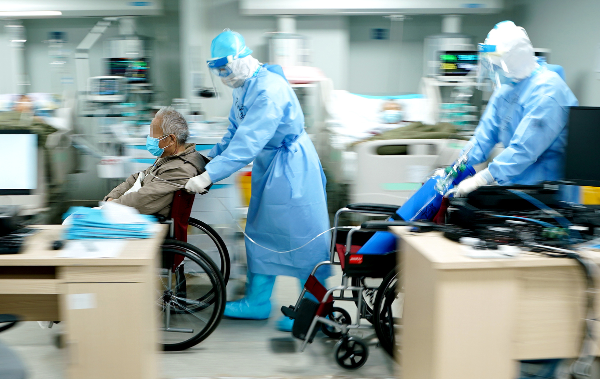 |
Doctors transit a severely infected patient with COVID-19 in a wheelchair, along with his oxygen cylinder at Huoshenshan Hospital in Wuhan, Hubei province, in March. [Photo by Wang Yuguo/Xinhua] |
GENEVA - Swiss-born Chinese pianist and composer Melodie Zhao began studying the piano at age 3, held her first stage performance at age 6, and has been holding master classes since age 14.
In early 2020, 26-year-old Zhao stole the hearts of her audience at Geneva's renowned Victoria Hall auditorium when she concluded a rendition of Beethoven's Piano Concerto No 5 with a 6-minute piano capriccio she herself wrote to honor the heroes of Wuhan, the central Chinese city that first reported the coronavirus outbreak.
The piece was originally titled Wuhan - The Dawn of Victory. Zhao says she took inspiration from a local folk melody and from reading about the bravery of Wuhan's young health workers on the front line. She says she felt a strong inner urge to do something that would somehow bring calm to her heart.
In less than two weeks - which included many a sleepless night - the capriccio was scored.
"As a pianist, I believe in the power of music. For me it is the best way to express my emotions and convey encouragement," she says.
Her aim was "not only to pay tribute and send a blessing to Wuhan, but also to honor the courage" it took for the millions in Hubei province to be the first to confront what soon would become a serious global health threat - and to convey the hope that together they would indeed overcome the virus.
And so they have. Wuhan's anti-epidemic campaign has achieved a decisive victory, and China has basically curbed the spread of the novel coronavirus.
Life in Wuhan has gradually gone back to normal, the lockdown was lifted in April and no domestically transmitted cases have been reported in Wuhan or Hubei province since mid-May.
Since its early spring premiere in Geneva, Zhao has performed the piano capriccio onstage several times in Switzerland, Sweden and Germany, and it has been revised and its title changed to Bells of Victory.
"I hope with all my heart that Europe will follow the example of Wuhan and China, and will find the way out of this crisis as soon as possible," she says.
Zhao also hopes to have more opportunities to play the piece in the coming years, "to convey to the world the spirit of unity and solidarity shown by the people of Wuhan and other places in the fight against the pandemic".
Zhao's father, Yuan Zhao, who is also a musician, got teary-eyed as he listened to the piece. "In my view, Bells of Victory is not only ringing for the success of Wuhan's fight against the epidemic, but also for humanity, which is strong and unyielding," Yuan Zhao says.